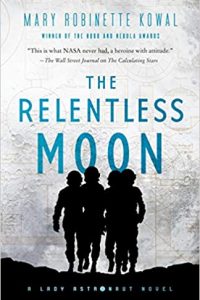Russell Letson reviews Walter Jon Williams
 Walter Jon Williams keeps on mix-and-matching genre elements and coming up with satisfying concoctions. In This Is Not a Game and Deep State, he combined near-future SF and international-intrigue materials in a now-familiar techno-thriller way. In The Fourth Wall, a sequel to that pair, he adds to the recipe one of my personal favorite guilty-pleasure ingredients: the show-biz mystery novel.
Walter Jon Williams keeps on mix-and-matching genre elements and coming up with satisfying concoctions. In This Is Not a Game and Deep State, he combined near-future SF and international-intrigue materials in a now-familiar techno-thriller way. In The Fourth Wall, a sequel to that pair, he adds to the recipe one of my personal favorite guilty-pleasure ingredients: the show-biz mystery novel.
The Fourth Wall uses some characters, technologies, and back-story from its predecessors, but its first chapters are pure Hollywood comic novel, with a flawed-but-knowing, down-at-the-heels insider introducing us to the sleaze and desperation beneath the glitz and glamor, someone who understands the way of his world:
I think about Gene Hackman’s character in Night Moves, the baffled, affable detective so completely unsuited to grope his way through the Hollywood labyrinth, through all the players who so completely fucked him over.
I’m not like that, I decide. I grew up here. I know exactly who’s going to screw me over and when.
My chief hope is that, if I just hang on long enough, I can get in a position to screw them all right back.
The speaker is Sean Makin, who should be sitting pretty after spending his childhood years on a successful sitcom, except that his parents looted his trust fund and decamped, leaving him nearly broke and all but washed up at 18. After a string of unsuccessful comeback projects (including the title-not-lead character in the languishing-in-litigation slasher movie Mister Baby Head), he is reduced to appearances on the pseudo-reality Celebrity Pitfighter show, in which he must duke it out with other has-beens under circumstances designed to extract the maximum of grotesquery and humiliation from the situation, for example, by filling the ring shin-deep in cottage cheese, which results in Sean getting not only pummeled into semi-consciousness by his hopped-up opponent but half drowned in gorp as well.
We get much of the official version of Sean’s career arc from his blog posts (each of which is accompanied by a thread of snotty reader comments), while from the off-the-record first-person narrative we gradually learn of the real disaster of his youth: his role in the death of a friend and colleague, a secret he would particularly not want revealed to the friend’s bereaved husband, whose brilliant directorial career declined terribly thereafter. All of this overture-and-back-story gradually comes into play when Sean gets hired onto the latest project run by online entertainment producer (and This Is Not a Game and Deep State protagonist) Dagmar Shaw. Dagmar is interested in Sean for the central character in Escape to Earth, a serialized, subscription-based, international, multi-platform, branching-plotline, quasi-participatory adventure narrative about an alien from an alternate universe. One reason Sean is being considered is because of his unusual appearance: as he grew up, he proved to have pedomorphosis, and as a result he is now six-foot-two with a ‘‘really, really huge head’’ and looks ‘‘like a sinister bobblehead doll leering unexpectedly at you from the dashboard of someone’s car.’’ But, hey, it’s not just a part, it’s the lead.
A number of other cast members from Deep State return, but as crucial as Dagmar and her crew are to the creation and unwinding of the central plot, this really remains Sean’s story, not only because he becomes a key player in the project (which neither he nor the reader entirely understands until the end of the book) but because he believes that the deadly events that start to plague the production are tied to his long-kept secret. The director Dagmar hires is that same bereaved husband out of Sean’s guilty past, and other professional friends and colleagues from his working days become part of the project. When a mystery SUV almost runs him down – twice – Sean chooses not to tell Dagmar of the incidents, lest she bounce him from the picture. Then one of the production staff is killed by a hit-and-run, and it is the beginning of a series of deaths that have Sean wondering whether there is a serial killer in the woodwork. He can’t figure whether it’s something to do with his personal dirty secret, or the production itself, or something that has followed Dagmar from one of her earlier problems (which even Sean has heard a little about).
What makes the book more fun than the usual mystery or techno-thriller is how the rest of Sean’s comic-novel of a life keeps rolling around and crashing into the Escape to Earth project. He still has to honor his contract with Celebrity Pitfighter, which means training for and fighting those bouts – and figuring how to fix them so that he doesn’t get injured or (worse) marked in ways that makeup can’t disguise. He has to deal with his mother, who sends ditzy e-mails from the ashram to which she donated $850,000 of Sean’s trust fund money. And then there’s the production itself. Because Sean genuinely loves acting, knows his craft quite thoroughly, and has an encyclopedic knowledge of film history and production, he makes an ideal guide to the culture and the processes (political, artistic, and technical) that make the magic happen.
Sean’s personal/professional world isn’t fundamentally science-fictional, but it’s as exotic and wonderful and textured and operationally detailed as any nifty-skiffy creation. Not that Williams altogether leaves out the tech stuff, which has that week-after-next, we’re-almost-there feeling you get from recent William Gibson novels. (In fact, there’s what I take to be an homage to Spook Country in the first chapter.) But what drives the foreground action is less the techno part of the thriller than the tangle of damaged relationships, mixed motives, wounded egos, hidden agendas, and raw ambition that make up the pocket universe of show business. And through it all strangely shines Sean’s genuine love and understanding of the only profession he has ever known. I’m recommending this one to my niece the actor. I don’t know what she’ll make of the technologies, but she will recognize the rest of it immediately.








Pingback:detective online games on the web | Investigation @ Top Information